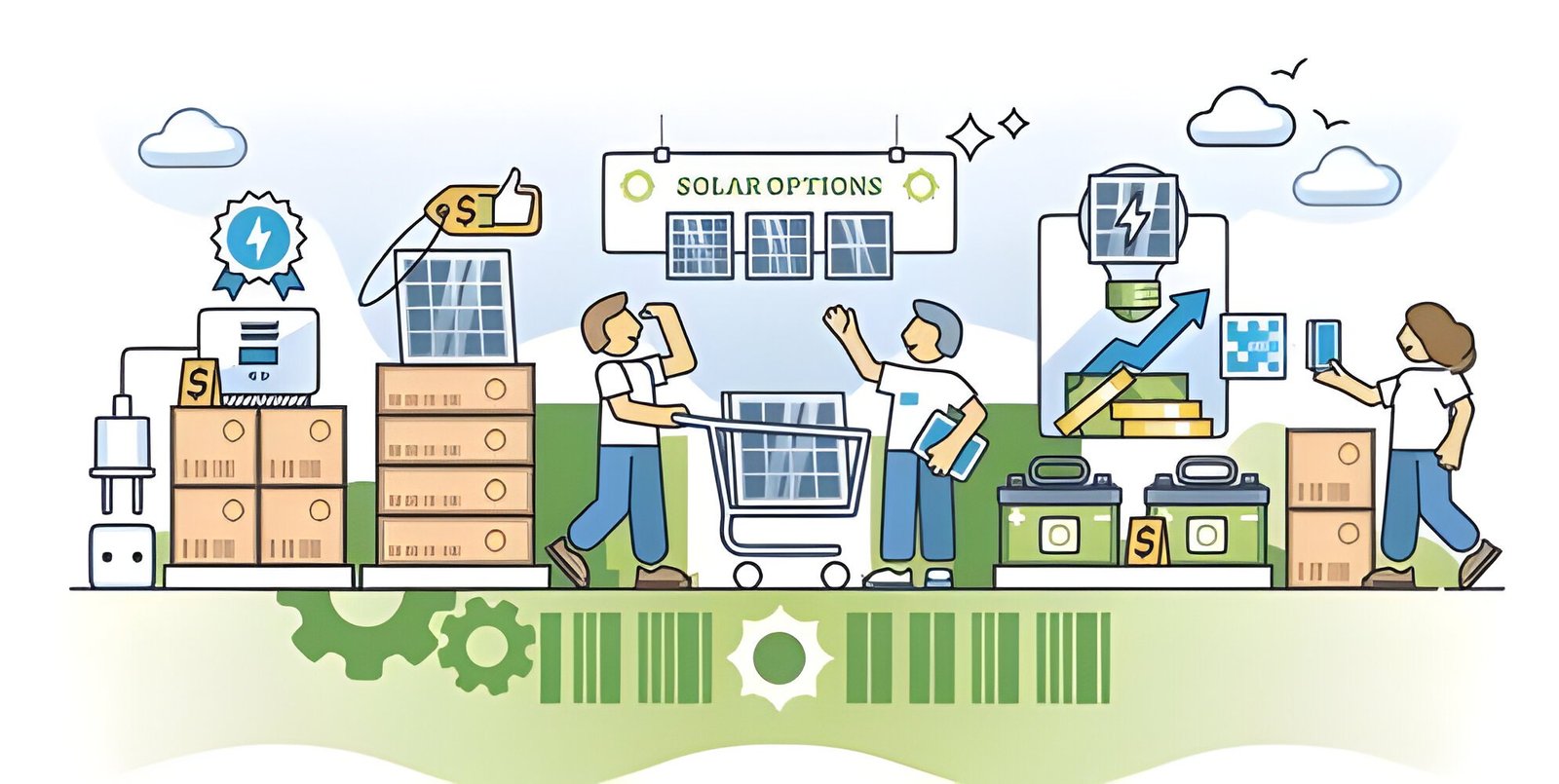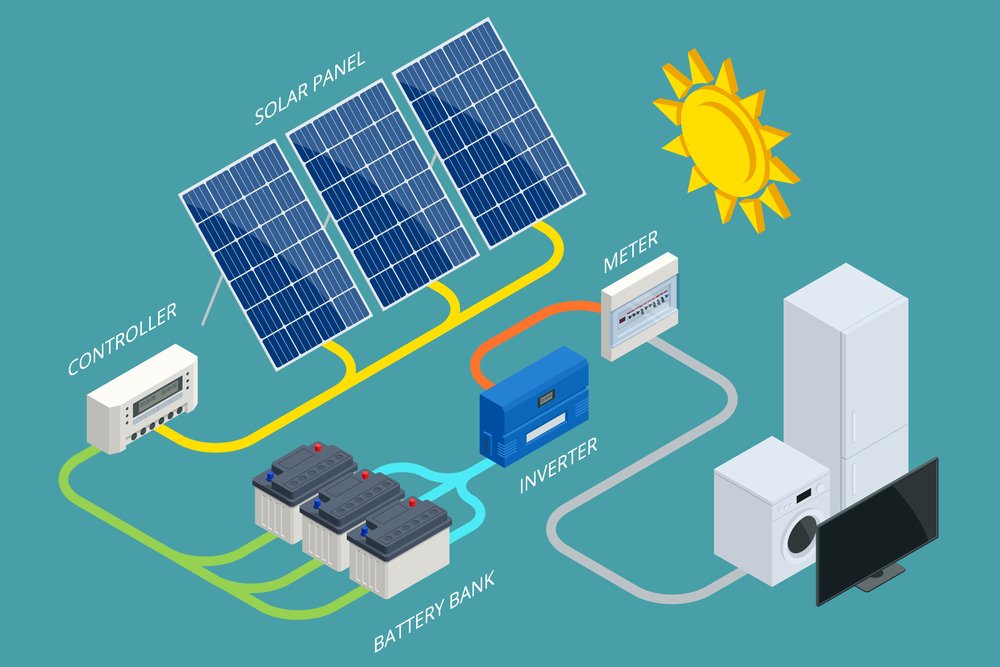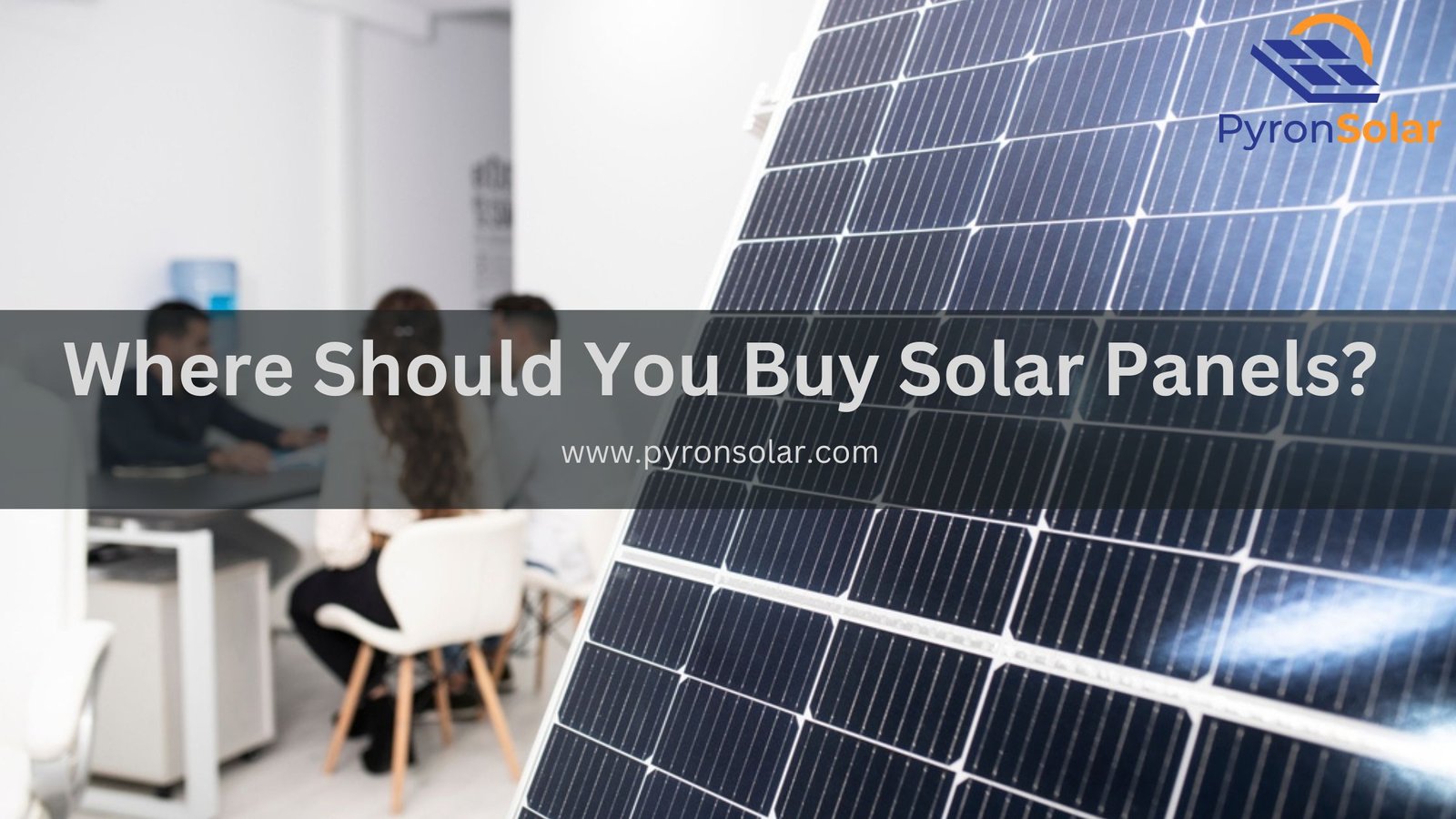You can buy solar panels online directly from private firms, resellers and solar companies that sell solar panels and solar powered products.
In 2023, the United States installed 32.4 GW of solar energy, which was a 51% increase from 2022, based on the reports of SEIA and Wood Mackenzie. The total growth of solar capacity in the U.S. is estimated to grow upto 673 GW by 2034, thereby promising to power above 100 million homes by launching various financial schemes.
Switching to solar power offers you several benefits such as increased property value, greater return on investment (ROI), energy independence, enhanced financial savings and reduced environmental impact.
Before searching for where to purchase the best types of solar panels that offer high efficiency and warranty, you need to know the procedure to buy from local retailers and online stores. This helps you compare the best pricing options on various equipment. Also, it is important to know your energy requirements and plan for the best solar installer in advance which will be discussed in detail.
Where Should You Buy Solar Panels?

1. Authorized solar companies:
- Pros: Certified deals with top manufacturers ensure proper quality and installation.
- Cons: Higher cost due to installation and maintenance services.
2. DIY kits at Home Stores or Amazon:
- Pros: Highly affordable and prepared for self-installation, directly sold by the distributors.
- Cons: Does not come with a long-lasting warranty, and requires in-depth technical knowledge for installation.
3. Wholesale Resellers:
- Pros: Affordable and easy to find a wide range of products compared to other choices.
- Cons: Difficult to find an installer.
4. EnergySage Marketplace:
- Pros: Easy comparison of quotes from several providers.
- Cons: A service fee is charged.
5. Manufacturer’s website:
- Pros: Best price and complete warranty coverage.
- Cons: Installation needs to be separately arranged which results in additional expense.
6. National Installation Companies:
- Pros: Many years of experience in the installation of residential solar panels.
- Cons: Higher prices due to permitting and interconnection processes.
Solar Installer
Solar installers are the technicians who install solar panels for both residential and business properties. They safely attach the panels to the roof or other structures by integrating the panels into the electrical system to perform accurately.
As a result, the solar panels buying option is simplified because the installers provide expert advice on the best type of solar system and handle all requirements of the installation process by acquiring necessary permits and inspections. Also, they provide the service support of maintenance and repairs after purchase.
Let us evaluate the pros and cons of purchasing solar panels from an installer:
PROS:
- Accessibility to wholesale prices: These installers can easily access the equipment at a lower price than the value available to the public.
- Professional installation: Perfect training is provided to installers so that the system is installed safely and properly.
- Comprehensive warranties: Installers offer warranties that cover both equipment and workmanship, thereby providing peace of mind to users.
CONS:
- High cost: The installation cost can be higher compared to other options such as the DIY method.
- Limited equipment options: A few solar installers provide equipment from specific manufacturers that limits the options available to customers.
Buying from Local Retailers and Online Stores
Purchasing solar panels independently from local retailers, online stores or manufacturers is an ideal option for buyers planning to invest in smaller or DIY projects. This allows buyers to select specific equipment based on their needs and the potential to save costs.
There are certain pros and cons of buying solar panels from retailers and digital platforms:
PROS:
- Potential for cost savings on equipment and installation: Purchasing a solar panel independently can be cheaper than buying them through a solar company as you won’t require paying the additional cost for installation or other services.
- Wider variety: You can choose the best variety of equipment for your specific needs.
CONS:
- Safety concerns: Without professional installation, there are chances of injury or other risks due to improper installation.
- Warranty issues: You might not get a complete warranty that covers both equipment and installation, which results in additional expenditures if something goes wrong.
- Requires a skilled installer: You will require a highly experienced installer for more complex rooftop installations.
- Smaller sized and not suitable for homes: Few types of solar panels are smaller and wouldn’t be suitable to power an entire house, thereby generating less electricity for the same amount of sunlight.
- Less efficiency: Few independently purchased solar panels might not offer high efficiency when compared to full-service solar companies.
Factors To Consider When Buying Solar Panels

Along with the energy requirements, you need to consider several factors of solar panels such as their type, efficiency, warranty, and comparison of pricing and financial options.
Types of Solar Panel
Let’s compare these three main types of solar panels in terms of efficiencies, cost and ideal uses:
- Efficiency: 15% to 24%.
- Cost: $1 to $1.50 per watt.
- Uses: Suitable for limited space where energy requirements are higher.
- Efficiency: 13% to 16%.
- Cost: $0.90 to $1.50 per watt (Cheaper than monocrystalline)
- Uses: Applicable in larger installations where space requirements aren’t a limitation.
- Efficiency: 6% to 15%.( CIGS: 13% to 15%, CdTe: 9% to 11% and A-Si: 6% to 8%)
- Cost: $0.50 to $1.50 per watt.
- Uses: Suitable for special applications such as Building Integrated Photovoltaics (BIPV), solar-powered clothing, portable solar devices and several others.
Energy Requirement
There are several factors to ensure that the system meets energy needs such as:
- Figuring out your electricity consumption: You need to collect at least 12 months of your current bills to determine your average daily electricity consumption in kilowatt-hours (kWh). By using an online solar calculator, you can estimate the correct size of the solar systems needed based on your home appliances, their wattage rating and hours used in a day.
- Increase Solar Power Generation: To minimize the shading of objects, you need to expand the size of your solar array or adjust accordingly to sunlight exposure to enhance power generation.
- Battery Storage Solutions: Planning for an off-grid, requires a battery storage system that can increase efficiency and reduce the grid dependence.
The differences between standalone and grid-tied systems help to understand which is more suitable for various household sizes and energy demands:
- Standalone Grid Systems or Off-Grid Systems aren’t connected to the grid and produce solar energy that gets stored in the battery and provides electricity during night or outages. Particularly in remote areas, this is the best alternative where there isn’t any electricity or grid access.
- Grid Tied Systems, also known as the On-Grid Systems are always connected to the grid and energy is fed to the grid produced by solar panels. Especially, when there isn’t much sunlight, the grid stores your solar energy and this system is suitable for urban areas.
It is important to consider the physical size of the panels and the efficiency of energy conversion because larger panels can generate more power. Whereas the conversion efficiency of a photovoltaic cell (PV) indicates the percentage of the solar energy captured on a panel that is generated into usable electricity.
Solar Panel Efficiency
It is crucial to choose high-efficiency solar panels as they produce more energy from less space and require fewer panels for installation, thereby reducing the overall solar system cost as well as the time to recover the upfront cost.
Selecting a properly sized inverter is essential for the overall efficiency and effectiveness of your solar PV system. The oversized inverters help future expansions like increasing your solar panel array without requiring any replacement. On the other side, the undersized inverters optimize your system’s performance depending on certain conditions to balance your energy needs with additional risks involved during peak times.
Also, the higher inverter efficiency converts more power from the direct current (DC) to the alternating Current (AC). Mainly, you need to know that no inverter is 100% efficient as there will be some energy loss during the conversion process. Therefore, you need to check your present and future needs to select the correct inverter that aligns with your solar panel’s characteristics.
Solar Panel Warranty
Warranty coverage is a key factor in the solar panel purchasing decision due to these reasons:
Quality Certification: Typically, warranties are like an assurance for higher quality products.
Financial Security: You can get financial protection against defects, malfunctions or early failures that compensate for important repair or replacement costs without requiring any additional investment.
Satisfaction: By knowing that your investment is supported by a warranty, you will get peace of mind as the manufacturer or installer will resolve the issues promptly.
Mainly, the warranties contribute to long-term reliability and performance by ensuring that the solar panels will be replaced or rectified if any issues arise faster than the manufacturer’s specified rate.
Typically, homeowners should expect these important factors from a solar panel warranty that include:
- Coverage period with at least 10 years of protection.
- Different types such as product warranty, performance warranty and workmanship warranty
- Extended warranties to compensate for the replacement or repair of solar panels and inverter along with the labour cost to install the replaced versions.
- Transferability of your warranty to a new house owner.
There is also a lot more to know about solar warranty.
Comparing Pricing and Financing Options
The cost structure for home solar systems can be categorized as:
1. Panel Cost: An individual 400 watts solar panel costs between $400 to $600.
2. Installation Cost: Fully installed solar panels cost between $3 to $5 per watt before applying 30% tax incentives.
3. Cost per square foot: Planning a solar system for a 2,000-square-foot house costs $28,750 before incentives and $20,125 after the 30% tax credit.
4. Mounting Type: The prices vary according to these different types of mounting such as:
- Fixed Mount: $15 to $50 per solar panel
- Ground Mount: $70 and $200 for each solar panel.
- Adjustable Mount: $30 and $250 for each solar panel.
- Dual Axis Tracker: $450 to $780 per solar panel.
5. Average solar system cost: An average 6 kW solar panel in the US costs $12,000 – $30,000.
Various financing options impact the overall cost and savings of a solar installation such as:
- Cash Purchases for solar energy systems are preferred by a few homeowners, despite high upfront costs to maximize return on investment (ROI) and benefit from tax credits and other incentives.
- Solar loans are a similar concept to other types of credit following the two main types namely secured and unsecured loans that allow you to save money through government tax credits and several incentives.
- Solar lease involves monthly payments to solar companies for energy usage. It is especially beneficial for tenants who might not be staying on a long-term basis and wouldn’t be eligible to receive solar tax credits and other incentives.
- PPA: The Power Purchase Agreements (PPA) involve a third-party developer or to install, own and maintain the entire system. The generated solar power is sold to the homeowner for a lesser rate than to be paid to a local utility company.
How to Buy Solar Panels?
Here is the step-by-step process for acquiring solar panels:
1. Consultation: Meet your area’s top solar panels to compare pricing.
2. System Design: A representative observes your roof and solar system design to satisfy the energy demands.
3. Permit: You need to acquire permits and approvals from your municipality before installing a solar panel system.
4. Net Metering: Ahead of the installation, you need to apply and register for a net metering scheme offered by your local utility company.
5. Installation: Your installer can start the work by mounting the system after receiving the necessary approvals. Depending on the complexity of your project, the installation takes a day or an entire week.
6. Evaluation and Clearance: The overall system needs to be evaluated for safety before acquiring any clearance that will be handled by your solar company.
7. Operate your system: After receiving final approvals, you can operate your system following the installer’s guidance. Also, track the production and ensure proper functioning through monitoring systems.
8. Registering for tax credits: Many reputed solar companies will guide you on how to apply for solar tax credits, rebates or other subsidies available in your locality.
Hiring a professional installer differs from purchasing panels for a DIY installation. This helps you to gain benefits such as – higher quality and longevity, safe and error-free installation, grid connection, panels positioned for maximum efficiency, easy permits, and superior quality workmanship.
Every DIY solar buyer should consider these factors when buying and installing their own solar systems which include:
- Evaluate your DIY skills for installing racking systems, wiring, and electrical panel connections.
- Documentation system to store quotes, permits, site assessments, and all other relevant documents.
- Perform local research and obtain permits.
- Conduct site inspection.
- Determine your energy requirements.
- Choose off-grid or on-grid systems.
- Select panel type, inverters, and equipment.
{Video Credit: Nicolas Raimo}
Equipment for Your Solar System

These are the additional components necessary for a comprehensive solar panel system installation listed below:
- Solar Panels
- Charge Controllers
- Racking and Mounting Systems
- Inverters
- Solar Battery
- Critter Guards
Let’s discuss these main components that ensure the efficiency and functioning of solar panel systems in detail:
- Inverters convert the DC output of PV modules into AC output that can be scaled up in voltage via transformer more conveniently, and it is cost-efficient. Different types of solar inverters play a crucial role in reducing the shading effect to enhance the system’s energy output.
- Batteries are storage equipment to preserve excess power generated for future use by converting electrical energy from the PV modules to chemical energy.
- Mounting Systems provide the necessary structural support to hold solar panels at an optimum tilt that influences the overall system temperature. They are necessary for maintaining the proper design and functioning of the PV system.
- Wiring is mandatory to connect all components of the solar panel system. In other words, it transfers the electricity from solar panels to inverters and further to the electricity system of your home.
- Critter Guards are manufactured from PVC-coated aluminium fencing to safeguard your solar panels from animals that chew the wirings, create nests and leave waste on solar panel arrays, thereby leading to short circuits, diminished efficiency and fire hazards.
Conclusion
Overall, these are the best places to purchase solar panels the opinion varies according to an individual’s specific needs and circumstances which include these alternatives:
- Top solar companies such as Tata Solar Power and Panasonic are excellent choices for residential customers who prefer professional installation services, the best financing options and warranties on a long-term basis.
- DIY installation kits are used for small-scale installation that can be obtained from online retailers or home improvement stores such as Home Depot or Amazon to connect off-grid solar panel systems. But, you need to have proper knowledge about the equipment and installation procedure. Also, you won’t be able to gain benefits in the long run.
- Although a Manufacturer’s website offers a reasonable price and best warranties, you need to be ready to invest additional amount for installation.
Conclusively, you need to perform detailed research and contact an experienced solar contractor with a successful track record. This is because some solar companies offer rewards in the form of referrals starting with $1,000 or more. Therefore, it is recommended to continue with your analysis and find out the best solar companies or installers in your area.
Ray is an avid reader and writer with over 25 years of experience serving various domestic and multinational private and public energy companies in the USA.

